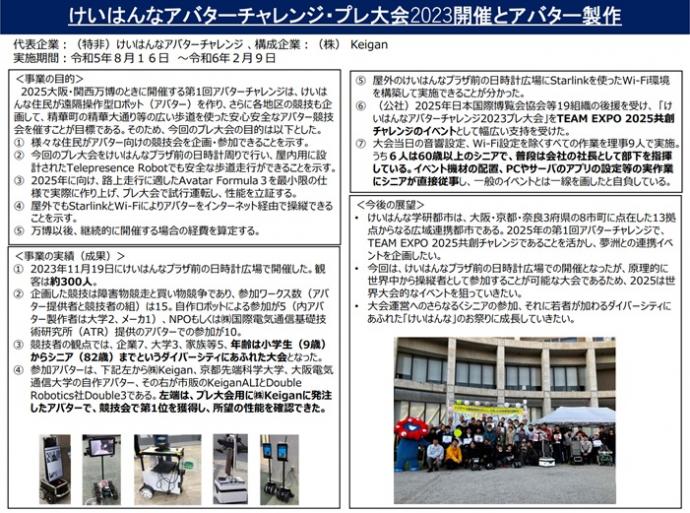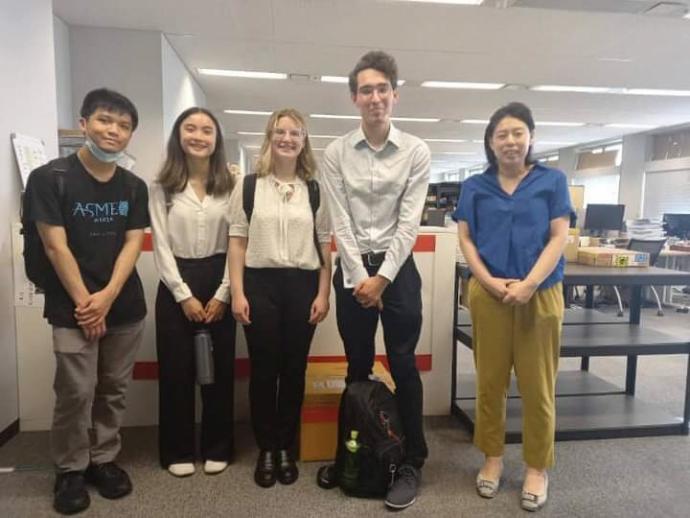ここから本文です。
株式会社Keigan(京都企業紹介)
知恵の経営、元気印、経営革新、チャレンジ・バイの各認定等を受けた府内中小企業を紹介するページです。
2023年度スマートけいはんな実証促進事業補助金実績報告
(2024年3月26日、ものづくり振興課 足利)
愛知県「サービスロボット社会実装推進事業」の実証に挑戦します!
(2024年1月、ものづくり振興課 小高)
当課が取り組むロボット共生カフェでもご協力をいただいている株式会社Keiganがこの度、愛知県の「サービスロボット社会実装推進事業」(外部リンク)に参画し、2024年1月30日(火曜)、31日(水曜日)に愛知県半田市立半田病院(外部リンク)において、ご家族案内ロボット(お困り事サポートによるお客様体験価値向上)の実証実験を実施
A Foreigner Friendly Guide to Studying and Working in Kyoto, Japan!
Special Feature! – Interview with Zishan Anshan from Keigan!
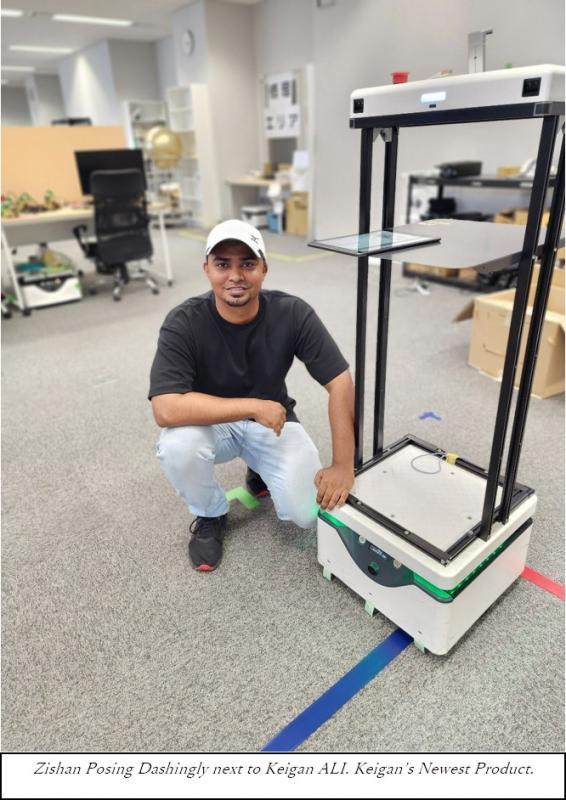
Interested in learning more about engineering and programming jobs in Kyoto, Japan? Well we interviewed a foreigner working at one of Kyoto’s innovative Start-ups, Keigan for more information!
It is no doubt that the world is going through another industrial revolution. We are living in an age of unseen global cooperation and business, which none of us can quite fathom the effects of yet. But recently, we have seen major breakthroughs in robotics and AI technology.
I mean I can have a riveting conversation with an AI on the internet about how human history would play out but instead of humans, it was rats. And programs like ChatGPT do an amazing job delivering such content to a scary extent.
Regardless of a Rat-run world (which would most definitely also have a Rat ChatGPT), innovation is the name of the game in today’s society, and companies like Keigan are playing that game.
Welcome to another installment of ‘‘A Foreigner Friendly Guide’’. This time around I got the chance to interview Zishan Anshan, an Engineer from Bangladesh that currently works at Keigan. I wanted to get a real perspective of people currently working in Japan since much too often people either have a fantasized view or a doom and gloom view of the country. I’m hoping as you read through Zishan’s experiences and life, you can get a better picture of what working in Kyoto is like!
The company Zishan works at, Keigan, has been a fan-favorite over here at the office! Can’t go a day without hearing the mere name being said out aloud! It is actually how I got connected with Zishan and promptly requested an interview. Keigan is one of innovative start-ups in Kyoto working to build better access to robots for everyone. The company is currently quite small with about 7 employees as of June 2021. From my visit it gives some nice vibes with people being open with each other. Currently, they are actually open to and are seeking foreigner employees for their company.
When I first met Zishan for the interview, and we exchanged business cards as is Japanese custom, I could tell he was a little bit nervous. I guess the idea of getting interviewed by the Kyoto Prefectural Government of all things can seem quite intimidating. But I promise I’m not scary! Worse thing that can happen is you say something unflattering about Kyoto, and I get you arrested for libel (which I naturally did not tell him)! Regardless, over time Zishan slowly let up and told me all about his personal life and experiences since coming to Japan.
Growing up in Dhaka~
Zishan grew up in Dhaka, Bangladesh. He grew up around the hustle and bustle of city life and never had experienced anything outside of that. His entire world was in this huge city, but growing up in the 90s, he started to noticed a lot of new, innovative products suddenly coming out into the streets. Stuff like Playstations and Walkman’s, things his child mind didn’t think were possible to have at the time. Well... Zishan got enamored by these new-fangled Japanese goods.
He later discovered the world of Japanese anime and video games, and that cemented his interest in Japan as a country. He saw the values experienced in shows like Naruto, Dragon Ball, and Samurai X (Rurouni Kenshin) and felt pulled toward it.
Zishan told me about the sheer excitement him and his friends felt watching Goku go Super Saiyan for the first time. They stayed home from school for that.
As he kept digesting more and more content, he started to feel a personal connection to ideals. Particularly to the ideals and values these cool, super awesome Samurai held and exemplified. Ideals like honor, discipline, helping others, and being persistent in the face of resistance. Their focus and balance of both being unemotional while being empathetic really interested him. He saw it being ‘Masculine’. And in his little sparkling, glittering eyes, that stuff was radical. He slowly learned that in Japan, others’ interests came first. The care they show for others was something he hadn’t really experienced all too much in Dhaka.
Zishan told me, ‘‘I think I felt a connection to them because I wanted that sort of ideology within myself. I could see myself reflected in those ideals…Though that was as a child through media, when I grew up, I was able to see it for myself’’.
Oh, did you first come to Japan as a tourist, student, or did you come here and immediately start working?
‘‘I actually found a job at Keigan first and came to Japan immediately to work!’’
Dang Zishan that’s kinda hardcore to immediately come to Japan to work like that, is what I thought at the time; however, Zishan actually studied a fair amount before coming through a recruiting agency in Bangladesh called Bjet. Naturally, I was curious about what he did in this agency since it seems like an amazing resource for anyone reading from Bangladesh currently *wink wink nudge nudge*.
Bjet Program and Business Culture~
‘‘I studied the language through a recruiting agency in Bangladesh, called BJET. They are actually the ones that got me connected to Keigan and the work here. They trained me a lot before coming to Japan. Taught me the language, culture, and business practices. I eventually passed the N4 exam before coming to Japan.’’
Dang, BJET really helped you prepare a lot since I can understand the sort of mountain that working in Japan can sometimes be for a foreigner at the beginning. Was there anything you were surprised about Japan while learning about it?
‘‘Definitely the business practices. I thought the business style would be like the U.S or Europe, so I was a bit surprised to hear all about the Salaryman culture of putting work first and these new terms like Zangyou (overtime work). Honestly, I was a bit put off by it all. I was like ‘‘Okay that’s a bit too much’’. But as time progressed, I slowly began to understand why such things are necessary. Japan has quite the emphasis on quality and craftmanship, and that dedication presents itself through the business culture. I remember learning in my training of how you should always be diligent, careful, hard-working, focused, and give plenty of time. In Japan, its normal to have a mentor assigned to you. I was fortunate enough to have an amazing mentor at Keigan that helped me a lot. But it made me realize, that if people put the time into you, you should be grateful that they gave the time to you and be focused and hard-working. Live up to their expectations.’’
I was pleasantly surprised by his response. He clearly thought about and reflected upon Japanese society and saw the connection between those traditional Samurai ideals he saw as a child, and those held within Japanese business culture.
I’m also sure a lot of you out there find Japanese business culture quite intimidating as well. It is very different from the rest of the world. But such things are changing in Japan. For example, throughout the interview Zishan would talk about his experiences working at Keigan. Zishan would constantly talk about all the support and such they give, and how he considers himself lucky to work at Keigan when he hears about some of the horror stories other foreigners have working in Japan. At least in Kyoto, a lot of the more recent start-ups have such an atmosphere.
Zishan’s raison d'etre for coming to Japan is a mix of both quality of life and business opportunity here. Naturally as a child he got interested in Japanese culture, but Zishan also strived for something different back in Dhaka. He tells me ‘‘See back in my country all the jobs were very similar. The opportunity in Japan differed greatly, and I wanted something different. Also, at the time, Japan was struggling with workforce problems and was looking for foreigners to work, so I saw a career opportunity that I had to take ahold of given my personal interests’’.
When I asked him to talk more about the quality of life, Zishan had A LOT to say. A lot of things like the accessibility of the public transportation system, the sense of security, high moral standards. Zishan had a hard time getting use to feeling comfortable leaving amazon packages out for an extended period of time. After all, in other countries, package poachers love to yoink any free packages they see out. And such standards do not end at packages as Zishan tells me, ‘‘People keep it. They keep that high moral standard. They maintain it. I truly don’t know how they do it, could be one of the big mysteries of the world, but this is very nice. It’s nice. I like it. It’s hard to believe, but you have to see it to believe it almost’’.
Zishan, like many other foreigners who have come to Japan, has his own stories of getting lost or losing items in Japan. But anytime he has had that happen to him, he feels confident that he will be okay since Japanese people have an incredible helping attitude. Whenever such a thing happens where he is helped out, he tells himself ‘‘Only in Japan’’.
When talking about all these aspects of Japanese society, he told me wished he could bring some of these back to Bangladesh with him. Stuff like the amazing customer service for example.
I also wanted to see if had any opinions on things he would like to see improved as a foreigner working in Japan. Zishan’s response surprised me since he proactively wanted to emphasize some of the strong points a bit more before doing that. He really likes the Japanese values of discipline, attention to detail, commitment to excellence.
He sees a lot of those strong ideals exemplified in the way Keigan is efficient and productive. Zishan truly enjoys working at Keigan and can experience participating in the innovative industry in Japan while working on cutting-edge technologies. The industry he felt the effects off as a child enjoying his Playstation2 at home was now something he could be a part of. Now he could contribute to the world in his own way, and maybe eventually give a child some new technology that will shape their perception of what’s possible.
Challenges adapting to Japan~
When we finally moved on to talking about some things he finds difficult or would like to change, he mentioned three main things: the traditional hierarchical structure, work-life balance, and language barrier.
Zishan has heard a lot from his other foreigner friends working in Japan about how difficult it can be to work within the hierarchy. People have a difficult time talking to their superiors or receiving feedback properly, which again made him realize how lucky he is to work at Keigan since he doesn’t have those same issues. But the traditional hierarchical structure coupled with the work-life balance makes things difficult. He occasionally struggles with that when he has some extra work to do. His motto is ‘‘Ahhh Kokoro ga Itai’’, which translates to ‘‘Bruh my heart be hurtin real bad’’ (Creative liberties were taken with the translation). But whenever he witnesses his Japanese co-workers continually diligently working, he is reminded of those ideals he looked up to as a child and is inspired to continue working.
When talking about the language barrier, it is of course difficult. People all across the world put down there Genki books because it’s simply. Too. Hard. Not to mention all the Kanji as well? How could anyone deal with 2,000 characters?? Some of these Kanji are asking you to turn into a Kanji-version of Piccaso to draw those complicated lines.
Zishan feels similar. Whenever he learns a new kanji, he immediately forgets the old ones. The battle to learn Kanji is perpetually never-ending for him. But outside of Kanji, Zishan also finds struggles trying to make friends with Japanese people.
‘‘At least in my experience, a lot of Japanese people tend to be a bit more on the reserved side. While they will talk to you and help you and be nice to you, it is still hard to become their friend sometimes. To paint a better picture, I have been in Japan for 1 year and 3-ish months, and in that time, I have made a lot of friends, but all of those friends are foreigners! I even go hiking and play badminton using apps like Meetup to find people, and I have made a lot of good friends through stuff like that. But it is not often I hang out like that with a Japanese person. I think it is most likely due to the language barrier, but partly that’s on me since my Japanese isn’t that good enough to make a conversation. It’s possible once I get better at Japanese that I’ll be able to make some Japanese friends better’’.
I had expected such an answer to be honest. The problem of the language barrier is an all-too-common one for foreigners living in Japan. Communicating in your own language can already be plenty tough for a lot of people, and now asking them to communicate in another language that are not yet comfortable in. It’s a tall ask for many people.
Similarly, I have a lot of people approach me about this issue on both sides. Japanese wanting to talk to foreigners, and foreigners wanting to talk to Japanese. In my experience, its best to accept that communication will not be perfect. Trying to communicate in another language that isn’t yours already shows that you want to communicate with native speakers. So, for Japanese studying English, and Foreigners studying Japanese, you can meet in the middle! Both sides know a little bit of the other’s language, so communicating in your little awkward version of Japanese or English is fine! You can use both languages to communicate. The feelings on conversation will pass through, which is half of what a conversation is. An exchange of thoughts and feelings among people to feel understood.
Zishan also complained about the low level of English proficiency in Japan: ‘‘Most Japanese companies will exclusively use Japanese in the workplace, so for a foreigner coming in, they need to have some level of Japanese competence to even work. So, for someone who wants to work immediately, it might be difficult for them with that in mind. In my case, I learned Japanese beforehand, but with COVID hitting I sorta stopped studying for 2 years, which made me forget a lot of Japanese. Plus, I lost the motivation to study really saying stuff like ‘‘Ah it’s too much work to relearn’’. So, I would like to see a little more English adopted in the workplace if possible. I think it would help current me quite a bit haha’’
So, in your perspective, you see the English proficiency, especially in traditional Japanese companies, as quite low, and if it were even just a smidgen higher, foreigners would probably feel a bit more welcome.
‘‘That and I think a lot of foreigners would immediately apply and come to Japan. Like they wouldn’t even give another place a second thought because most people who come to Japan come because they are interested in the culture and history. Naturally, I think this would lead to a lot more diversity in companies, which is always nice. Lastly, I would like to have more flexible work hours and work-life equilibrium. I think all of this would greatly enrich the working experience in Japan. Especially in our current generation, I think we desire and value a stronger work-life balance than the previous generation. That’s why I really enjoy working at Keigan since such changes have already been implemented to a certain extent. It has been a good comfort zone while my stay in Japan’’
Diversity is something that has been increasing in Japan in recent years. Most people see Japan as a homogeneous society, but as the foreign work force slowly grows, Japan gradually becomes more diverse. A common problem for many foreigners is finding communities they feel at home with. The communities exist, but they are hard to find.
A Chance Encounter with a Restaurant~
So, when Zishan told me about the Bangladesh community he found himself a part of on a fateful visit to a restaurant, I was quite intrigued. He told me he found the community by complete accident. Being a practicing Muslim, Zishan went on an adventure to find Halal food; however, Japan is notorious for being difficult for foreigners with dietary restrictions (Halal and Vegetarian food for instance). He got recommended the restaurant by a coworker of his for being Halal. When he first arrived at the restaurant, the first thing he saw was the Bangladesh flag out front. You can imagine the joy he experienced seeing his country represented like this in Japan.
As he entered the restaurant, named Mabrur Halal Dining, many curious eyes greeted Zishan. ‘‘Maybe they were having a party or something, but they immediately welcomed me inside’’. Zishan quickly got acquainted with the community at this quaint, little restaurant. The people Zishan met there showed him the ropes and helped him adjust to living in Japan. He recounts that it was that Bangladesh community that was the biggest help for him when he came to Japan. Now, Zishan goes to their weekly community events.
Being that I intern at the Kyoto Prefectural Government, I of course wanted to get Zishan’s opinion of Kyoto what parts does he enjoy the most. Gotta rep’ Kyoto appropriately after all. Zishan tells me of his appreciation of the deeper, more spiritual side of Kyoto.
‘‘I prefer the more spiritual side of things, and Kyoto has a lot of temples and shrines in the city. And I wanted to immerse myself in that side of Kyoto since I’m interested in the whole spiritually developing yourself ordeal. Being in a calmer location like Kyoto keeps things not as busy, which gives me more time to think and reflect on things. I guess I really wanted that ‘peace’ feeling. And over the past year, I feel as if I have grown personally quite a bit. Something I couldn’t do in Tokyo or back home in Dhaka. Kyoto ended up resonating with my personality and personal interests I think’’.
Zishan then recounts a time to when he wet to Nara for Obon, which is a national holiday in Japan. He didn’t know what was going on, but he was surrounded by loud music, chanting, and a jolly atmosphere. Zishan realized he had wandered into a festival, though he did not know specifically what festival it was or what it was for, he felt empowered. Zishan just stood around listening to the spiritual chants of the Buddhist monks, which he could feel gradually elevate his spiritual energy. Before he knew it, a long time had passed while he was entranced by the festival. The experience was something he only ever saw in Media, and now he was here physically? It was something he couldn’t quite wrap his mind around at times.
Certainly, from our conversation so far, I could tell Zishan had a deep love for Japan, culture and opportunity wise. While he has faced and is facing plenty of issues, he can adapt and deal with it thanks to the support he receives at Keigan and outside. Being that he has lived in Japan for the better part of a year, I was curious to see what sort of advice he would give to anyone out there looking to come to Japan to work or study (which I assume is most of you reading out there, so listen carefully folks!).
Some personal advice~
Zishan gives some of the more common advice of doing your research and studying Japanse, but he also mentions having a sense of adaptability and cultural sensitivity. Something he, himself, still struggles with.
‘‘Other than that, I think having a sense of adaptability and cultural sensitivity is important. As a Muslim in Japan, it was hard to adjust at first due to the lack of Halal food. Personally, I don’t think Japan is yet Muslim friendly because everything you want to eat might possibly be Haram, so you have to extra careful here. For instance, most of the emulsifiers used in Japan have some animal derivatives in them, so those are all no goes for me. Like a coffee I had recently, and loved, was apparently Haram since it has that emulsifier in it. So particularly for Muslims, they really have to cautious and watch for stuff like that’’
I truly didn’t expect that emulsifiers of all things would be such an issue, but it goes to show the level of caution one needs in Japan. Though fortunately, work in being done to better account for foreigner taste’s and restrictions, like the recent ‘’Kyoto Food Delivered to the World’’ event that was held! Wow what a nice little, not shameless, promotion for this event that I could do!
Lastly before leaving Zishan, I asked him about his current work at Keigan!
‘‘So, I work in the QA (Quality Assurance) division making sure everything is working well. I also do debugging for devices and backend programming. Basically, just fixing any bugs and issues that pop out. I can’t do as much now because I don’t know ROS as much, so I’m still studying how to use to be able to do more work’’
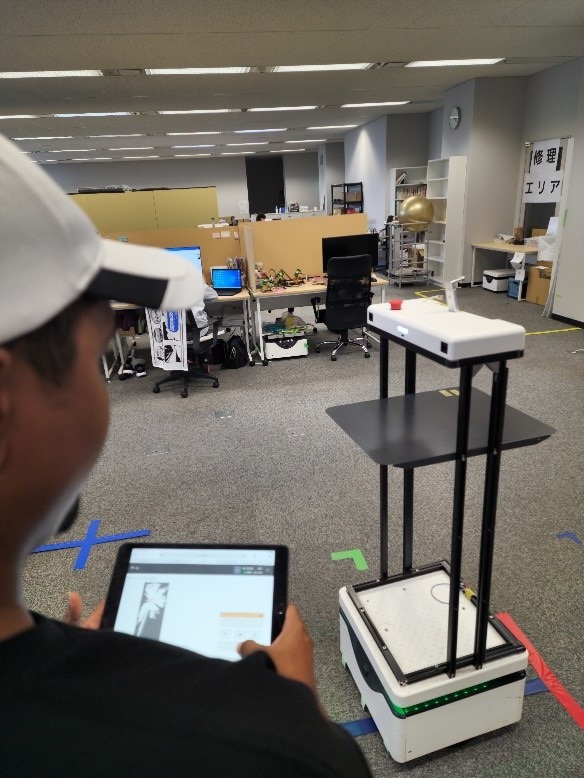
Keigan’s overall goal is to make robots available to more and more people, exemplified by their motto ‘‘Quick and Easy Robot for Everyeone’’. They work to create ATVs, AMRs, and modular motors. Their most recent being KeiganALI.
Currently, they are looking to employ more and more people as they scale up the business! Of course, if anyone reading this is interested, they can email recruit◎keigan.co.jp for more information! Their website is mostly Japanese at the moment, but they are in the process of getting some translations underway. From my interview with Zishan, I can see that Keigan is a wonderful company to work out, and I encourage anyone interested in learning more to reach out! Of course, if the language barrier seems intimidating, feel free to send me an email!
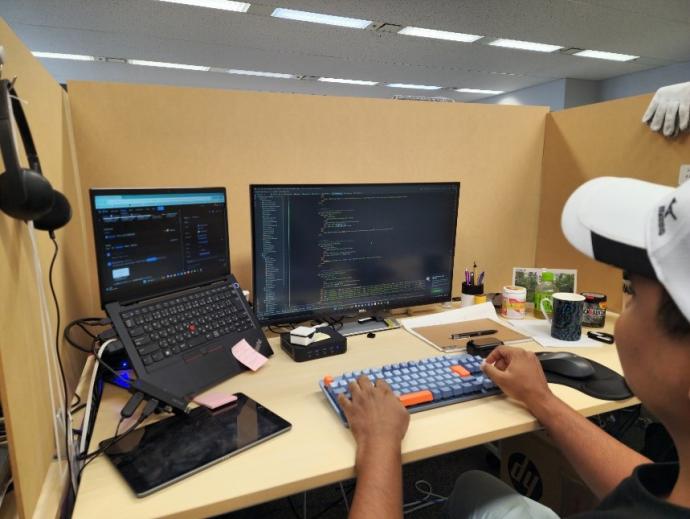
If anything, I hope people will have a better understanding what it is like for some people to work in Kyoto,
With that, I would like to thank you all for taking the time to read through this silly little interview, and I hope you stay tuned for more!
Kyoto Prefectural Government
Product Development Promotion Division
Pranith (Prius) Madishetti
CRCC Asia・京都府「米国大学生インターンプロジェクト」
(2023年7月10日、ものづくり振興課 足利)
ロボット共生カフェ(For the Life Cafe)
(2023年2月16日、ものづくり振興課 足利・足立・小高)
すぐに仲良くなれるロボット、KeiganALI
(2021年10月1日、ものづくり振興課 足利)
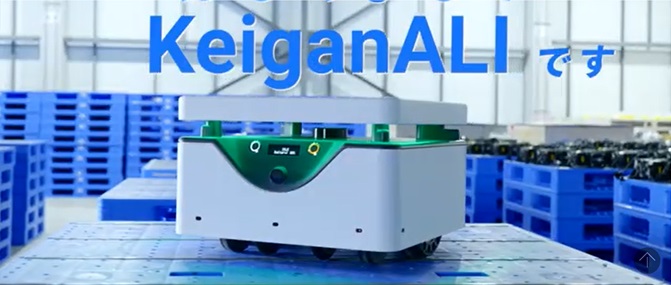
株式会社Keigan(外部リンク)(けいはんなオープンイノベーションセンター)の徳田代表取締役にお話をおうかがいしました。
KeiganMotor(モーター+マイコン+センサー+無線) = ロボット(制御+記憶+検知+共有+++)
--今回は新開発のロボットについてお聞きしに来たのですが、その前にまず、御社のコアテクノロジーである「KeiganMotor」についておさらいさせてください。例えば、「KM-1U モーターモジュール」は「340gの本体にマイコン、無線、センサー類を全て搭載」とありますが、そもそもモーターを動かすには、マイコンやセンサーが必要なのですか?
徳田)モーターを単に回転させるだけであれば、電源があれば回転させることは可能です。しかし、家電製品や自動車等でモーターを用いる際には、ただ回転させるだけではなく、必要に応じて回転速度等を変化させる必要があります。そのためにはセンサーやスイッチから信号を受け取り、回路による制御によって回転速度等を変化させたりします。
--子どもの頃持っていたおもちゃの車は、たしかに、その中身は電池とスイッチとモーターだけで構成されていましたし、スピードもいつも同じでしたね。回路による制御がないパターンだったわけですな。
徳田)制御の方式はいろいろあるのですが、マイコン制御の場合はCPUやメモリー等が搭載されており、予め設定されたプログラムに基づいて制御します。
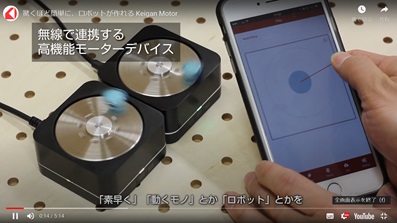
--センサーって何ですか?
徳田)加速度センサーやジャイロセンサーです。無線も内蔵しています。これらにより、マイコンによる超低速から高速まで幅広く微妙なコントロールだけでなく、直接手で動かして動作を記憶させる、トルクをリアルタイムで検知する、他の複数のKeiganMotorと動作を共有させるということができます。
--いいですよねえ!スマホやタブレットのアプリで遠隔操作できるのですよね。
徳田)はい、操作はもちろんプログラミングもですね。プログラムを書くことができる方が自由に臨む機能を追加できるよう、SDKやAPIはオープンソースで提供していますし、専門的知識がない方でも直感的に活用いただけるようにしています。
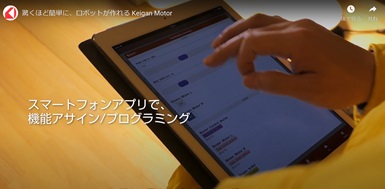
--これだけの機能を有していると、もはやこのインテリジェンスモーター自身がロボットですね。
徳田)そうですね。こうしてモーターを簡単に扱えるようになれば、誰でもロボットを作ることができます。
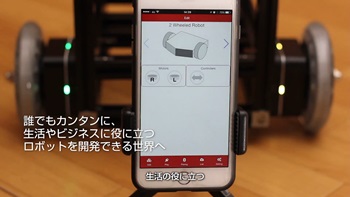
KeiganALI = 自律移動もライントレースもできるロボット
--マイロボットをDIYでささっと作る時代が来たという感じですね。そしていよいよ、今回開発されたKeiganALIについてお話をお聞きしたいのですが、これはどういったものですか。
徳田)人と一緒に働ける、荷物を運ぶロボットで、LiDARと複数のセンサーを搭載しており、人や障害物を自動で避けながら荷物を運びます。

--じゃあ、私、ちょっと、飛び出してみますと・・・、おお、止まってしまうことなく、うまく避けてくれるのですね。工場等の作業が滞らず良いですね!
徳田)特徴の1つは、事前に作ったマップを頼りに自律移動もできますし、床面のラインテープ、これは特別なモノではなく普通のテープですが、それをカメラで捉えてライントレースすることもできます。自律移動とライントレースを両方できるものって、意外とないんですよ。
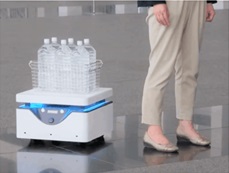
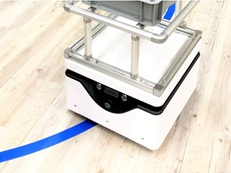
--いいですね。
徳田)もう1つは、操作性ですね。KeiganMotorと同様、スマホやタブレットのアプリで、マップ作成やルート設定、運用まで、タッチ操作で素早く簡単に行うことができます。
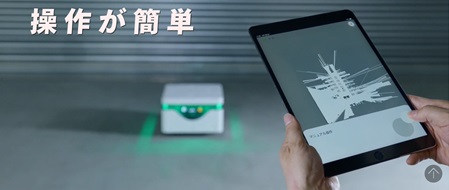
--簡単に仲良くなれそうですね!ついでに言うと、安いんですよね。そこも魅力ですよ!人手不足時代に手放せなくなるんじゃないでしょうかね。しかし、人材不足時代、御社自身も開発は大変だったんじゃないですか?
徳田)そうですね、スタッフに恵まれていますから大丈夫でしたし、けいはんなロボット技術センターのある、ここKICK(けいはんなオープンイノベーションセンター)には、次世代ロボットエンジニア支援機構も生まれており、彼らがインターンとして来てくれてもいるのです。
--それは素晴らしい!
徳田)当社は、「Quick and Easy Robot for Everyone」の理念のもと、省人化・自動化という課題に真剣に取り組んでいます。モーターのモーションコントロール技術から、電気・機械設計、ソフトウェア開発、量産化技術など、全ての開発を一元的に行っており、引き続き、製造現場やサービス現場での生産性向上に貢献してまいります。
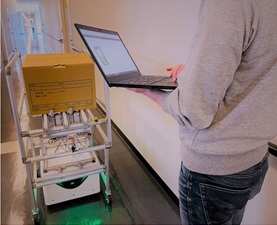
みなさん、ぜひロボットと友達になりましょう!
ROSロボット/ハードウェア勉強会 ご登壇
本社をけいはんなオープンイノベーションセンター(KICK)に移転!
(掲載日:平成31年2月26日 聞き手・文:ものづくり振興課 岩橋)
株式会社Keigan(外部リンク)は事業規模の拡大と今後の増員を想定し、本社オフィスを下記のとおり移転されましたのでお知らせいたします。
| 新住所 |
| 京都府相楽郡精華町精華台7丁目5-1 けいはんなオープンイノベーションセンター(KICK)(外部リンク)205 |
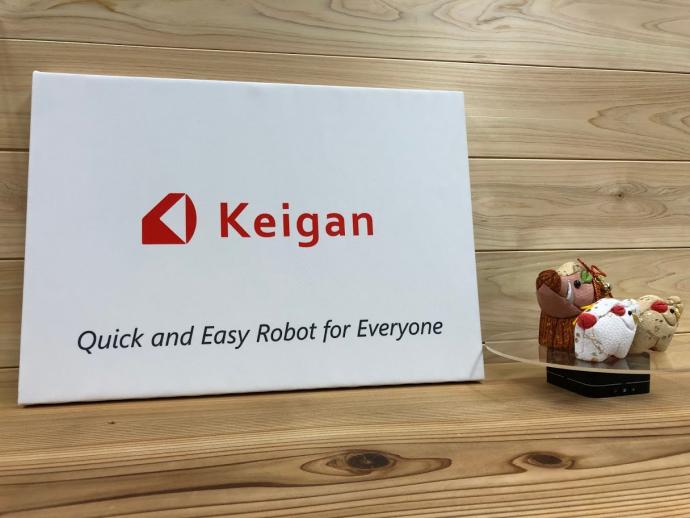
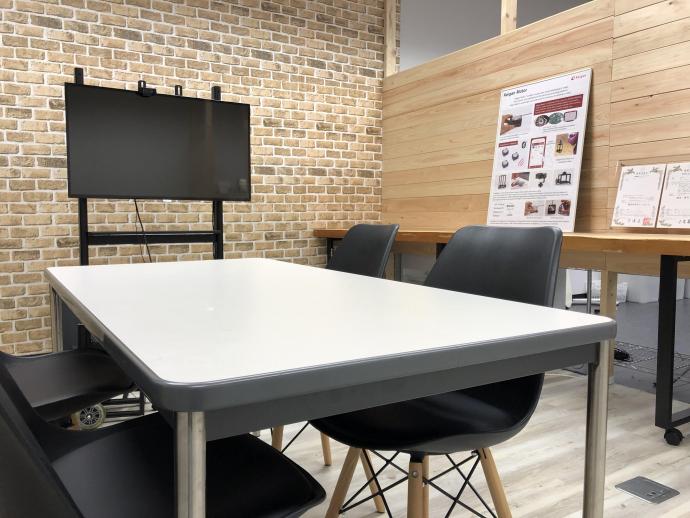
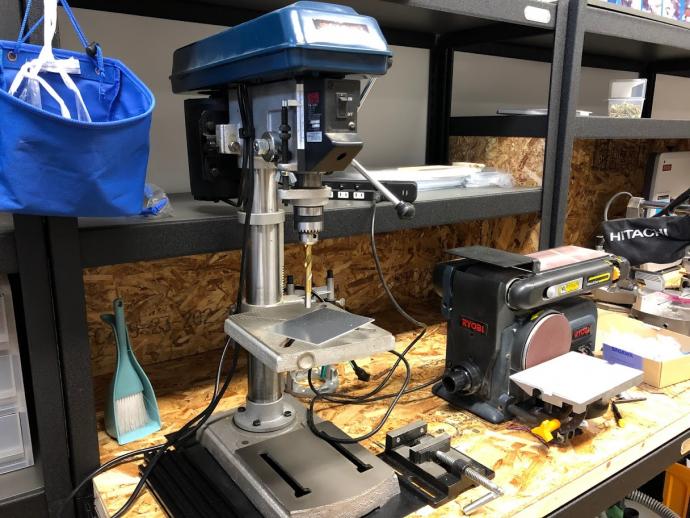
同社の德田貴司代表取締役及び栗本直彰取締役に下記のとおり今後の抱負についてお伺いしました。
「弊社は『Quick and Easy Robot for Everyone』を掲げ、誰でも簡単に素早くロボットを作る仕組みを提供しています。既にモーターとコントローラやセンサー、無線等を一体化したモーターモジュールⓇ製品 KeiganMotor を発売していますが、今後は KeiganMotor のラインナップの拡充に加え、今までよりも産業面で実用性のある製品やソフトウェアをリリース予定です。幅広い分野で活躍するロボットの仕組みを提供し、グローバルに異彩を放つ企業を目指します。」
本社移転によりさらなる発展を目指される同社の今後が非常に楽しみです!
ロボットを驚くほど簡単に、かつ瞬時につくることのできるKeiganMotor
(掲載日:平成30年2月28日 聞き手・文:ものづくり振興課 岩橋)
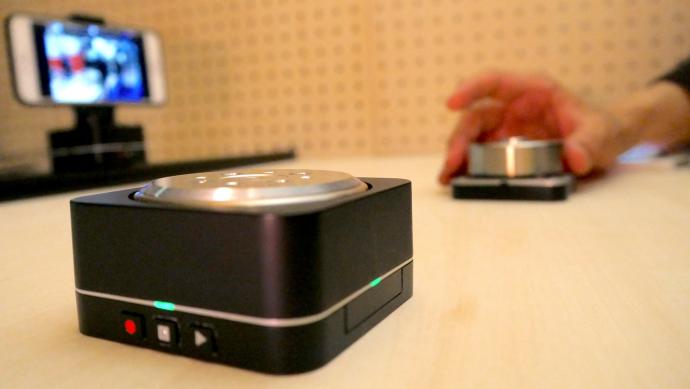
株式会社Keigan(外部リンク)(京都府相楽郡精華町)の德田貴司代表取締役様にお話しをお伺いしました。
「全て自分でやってみたい!」との思いから起業
-まず、御社の概要について教えてください。
德田)弊社は、平成28年に設立されたモーター・ソフトウェア等の開発、製造、販売を行うベンチャー企業です。主な生産品は、モーターとICT技術を組み合わせたインテリジェントモーター製品「KeiganMotor」です。
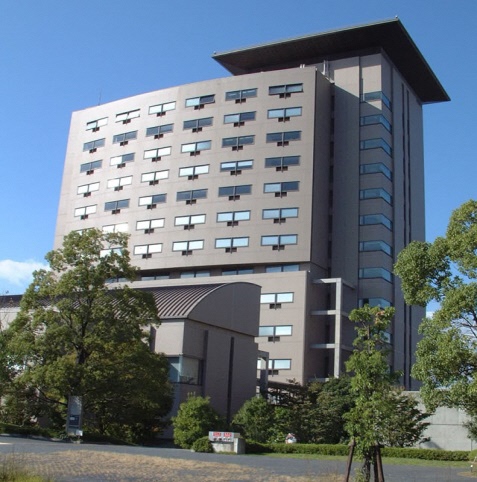
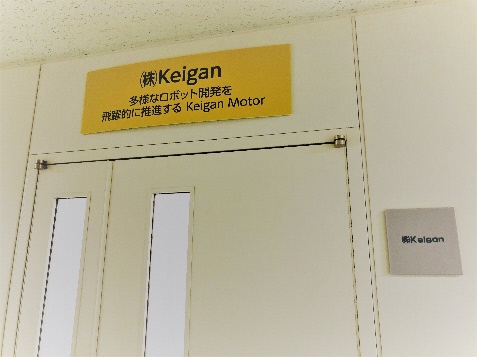
(左:株式会社Keiganが入居されているけいはんなプラザ、右:株式会社Keiganのオフィス入口)
-御社の製品では、そのKeiganMotorが有名です。どのような経緯で開発するに至ったのでしょうか。
德田)元々自分はシャープ株式会社でコピー機を作っていました。ただ、その中で自分たちで企画したものを世に送り出したいという思いが募っていきました。大企業では企画部署が企画し、その仕様書に基づいて技術部署が作る、またそのコアとなる要素検討は別の研究部署が行うというのが基本だと思いますが、その一連の流れを全て自分たちの手でやってみたかったというのが大きな起業のきっかけです。自分自身はメカの設計者でしたのでハードウェアに造詣が深かったですが、退職後は独学でプログラミングを学び、スマートフォンで動作するアプリを作っておりまして、ソフトウェアについても知識を深めていきました。その後、総務省主催の「異能vationプログラム」に「視覚ジャックシステム」というテーマで応募し、採択を受けて研究を行っておりまして、その研究の過程でモーターモジュールの開発に取り組みました。その中でモーター自体をより簡単に使える仕組みを作りたいという考えに至り、KeiganMotorのアイデアが生まれ、試作品を作りました。その試作品に感動してくれたフジマイクロ株式会社さんが共同研究開発を申し出てくださいまして、開発が飛躍的に進みました。そして、平成29年2月にKibidango、3月にKickstarterでクラウドファンディングを実施し、国内外で約550万円を集めることができまして、量産化に至りました。
「モーター自身にロボットの機能を入れる」という閃き
-なるほど。では、そのKeigan Motorの特徴について教えてください。
德田)KeiganMotorは、「モーター自身にロボットの機能を入れる」というアイデアから生まれた、今までにない全く新しいデバイスでして、とにかく誰でも簡単に使えるというのが特徴です。通常、モーターとそれを動かすために必要な電子部品は別々になっていますが、弊社のKeiganMotorはそれら全てが搭載されたモーターモジュールです。速度と位置の精密な制御が可能なブラシレスサーボモーターと制御システムを内蔵しておりまして、超低速からスムーズに、かつ静かに動作するだけでなく、複数のKeiganMotorを連携させる、トルクをリアルタイムに検知する、単体で動作を記憶するなどといった、従来のモーターにない特徴を持っております。無線(Bluetooth Low Energy)で通信するため、30m程度の範囲であれば、スマートフォンやパソコンから、自由に動きをコントロールすることができます。さらに、加速度センサーやジャイロセンサーを内蔵しており、姿勢制御などの高度な応用もできます。このようにモーター自身に様々な機能が入っておりますので、配線や回路・機械設計、ソフトウェア技術等の高度な専門的知識をお持ちでない方にも気軽にかつ簡単に使っていただくことが可能です。また、非常に磁力の強いネオジウム磁石を使用し、巻き線の構成やモーター内部の設計にもこだわりまして、最大トルク3kgf・cm 以上出力可能な、USBモバイルバッテリーでの省エネ動作を実現しました。
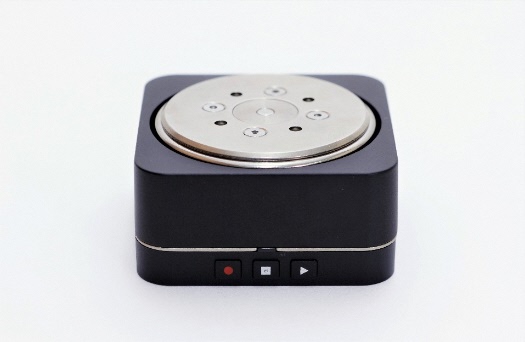
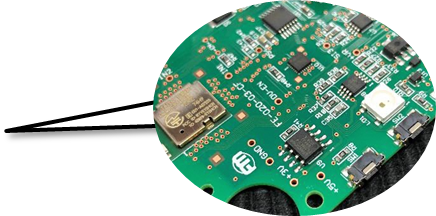
(左:KeiganMotor、右:KeiganMotor内部)
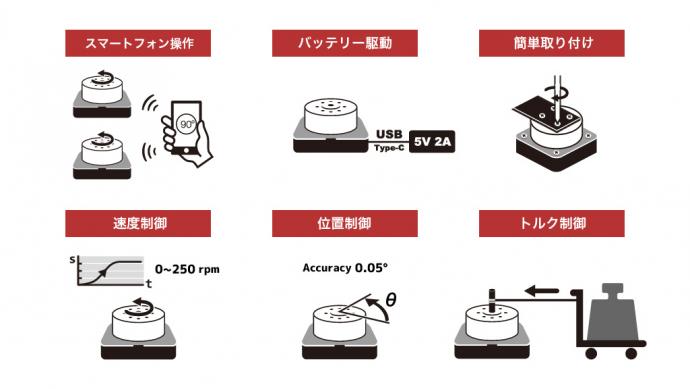
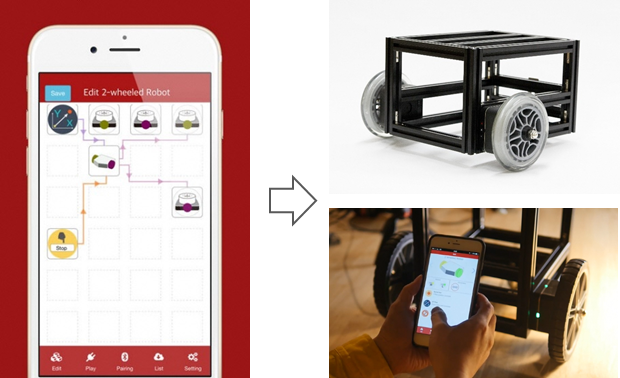
(KeiganMotorの特徴)
-すごいですね。
德田)モーター自身に機能を入れるにあたっては、プログラミングを活用してアプリで実現しているところですが、プログラムを書くことのできる方には自分自身が望む機能を入れていただくことが可能でして、開発におけるSDKやAPIはオープンソースで提供しています。また、プログラムを書くことのできない方にとってもフラッシュメモリを搭載しているため、直接手で操作していただき、その動きを記憶・再生することができますので、専門的な知識がなくても直感的に活用いただくことが可能です。
-実際に購入される方はどういった目的・用途で使われることが多いのでしょうか。
德田) 弊社としては、メカエンジニア、ソフトウェアエンジニア、研究者、デザイナーなどの強力な開発ツールとして、また、本格的なロボット制作や動くもののアイデア実現のために、特に「ラピッドプロトタイピング」(迅速な試作品製作)を目的に使っていただければと考えております。例えばメカエンジニアの方は、今までになく簡単に使うことのできるモーターとして、試作から実験まで幅広く使用して頂くことができます。基本的にはUSBポートから給電するだけでスマートフォン等からすぐに使用することができます。ここまで簡単に使うことのできる速度、位置、トルク制御が可能なモーターはないと思います。また、通常、モーターは機器に組み込んでしまった場合に動作を変更することは容易ではありませんでしたが、KeiganMotorでは動作を内部に記録する機能がありますので、機器に組み込んだ後でも現場の方がプログラミングなしに動作を変更することができます。ソフトウェアエンジニアの方は、短いプログラミングで制御ができるモーターとして、今までロボットやハードウェアに関する開発経験がない場合でも気軽にお使い頂けます。もちろん研究者やデザイナーにとっては、動くコンセプトデザインやモックアップの作成に最適なツールとなります。
-なるほど。
德田)応用の可能性としては、2輪ロボットやロボットアーム、カメラ台などが挙げられます。一般販売している中には、ロボットスターターキットというものがありまして、購入後すぐに2輪ロボット、1輪1軸ロボット、2軸ロボットと3way以上の使い方が可能なものも販売しております。また、減速機(ギヤやベルト)を使用して頂くと、動作はゆっくりになりますが重量物を運ぶ台車やアームも作ることができます。実際に購入いただいた方の使用例を伺っておりますと、企業では自社製品に組み込んだり、機械を動かすときの角度を調節するために使ったりといった用途で使われることが多いようです。大学では顕微鏡のターンテーブルに応用していただいたりしているようです。
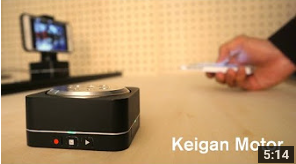
![]() 【Keigan Motor プロモーションビデオ】(外部リンク)
【Keigan Motor プロモーションビデオ】(外部リンク)
ハードとソフトを統合的に扱い、アイデアをすぐに形にできるのが強み
-既存のものに組み合わせて使われることが多いのですね。他社との差別化はどのように考えておられますか。
德田) まだこのようにモジュール化した製品は市場に出ていないと思いますので、その点ではすでに差別化できているかと思いますが、類似製品が出てこないとも限りません。ハード自体はばらしてコピーしようと思えばできますので、我々としてはソフトの部分を絶えず進化させていきながら差別化を図っていくしかないのかなと思っております。特許についてもソフトウェアとの融合でモーターに機能を実装するという部分を中心に取っておりまして、今後も他社に真似できない部分を伸ばしていきたいと考えております。
-ソフトウェアで差別化を図っていくということですね。それが御社の強みでもあると。
德田) そうですね。弊社の場合、ハードとソフトを統合的に扱えるのが強みだと考えております。KeiganMotorのような製品を作る場合、ソフトウェアですと大きく分けて3つ作る必要があります。モーター内部の組み込みソフトウェア、アプリケーションのソフトウェア、それからサーバー側のソフトウェアを少なくとも作る必要がありますが、これらは本来ですと別々の企業がそれぞれ作る、もしくは大企業では別々の部署がそれぞれ作るのが一般的です。我々はこれらを統合的に扱うことができますので、シームレスに開発が進み、アイデアをすぐに形にすることができるというのが非常に強みであると思っております。
BtoBからBtoCへ―誰もが「こんなものを作りたい!」という願いを容易に叶えられるプラットフォームの提供を!
-最後に今後の展望についてお聞かせください。
德田)今後はラインナップ戦略を取っていきたいと考えております。ようやく第一弾が出せまして、平成29年11月から一般販売を開始したところですが、お客様からはモーターなので種類がないと使いにくいという声があり、大小のサイズ等様々な要望をいただいておりますので、まずはその辺を充実させていきたいと考えております。また、我々自身がKeiganMotorをきちんと使いこなすことが重要だと考えておりまして、様々な使い方を発信していきたいと考えております。ターゲットとしては、価格帯の面からすると、個人にとっては少し値段が高いと思いますので、まずはBtoBに力を入れて企業のニーズに応えていきながら発展させていきたいと考えております。しかしながら、市場を見渡しても個人が簡単に使える安価なモーターは存在しませんし、そのようなモーターが出てくると企業だけでなく、個人でも「ちょい使い」ができるのではないかと思っておりまして、既存のラジコンサーボモーター一つをとっても素人からしたら使いづらいものですが、KeiganMotorのような製品を進化させていけば、その辺の垣根を取ることができるのではないかと思っております。将来的には趣味でものづくりを行っているような方などを対象にBtoCにも力を入れていき、誰もが「こんなものを作りたい!」という願いを容易に叶えられる、そんなプラットフォームを作りたいと考えております。
-今後の展開が楽しみですね!
【会社概要】
◆設立:平成28年9月
◆事業内容:(1)電気・通信機械器具の製造及び販売、(2)その他機械機器の製造及び販売、(3)ソフトウェアの制作及び販売
◆代表:代表取締役 德田貴司
◆資本金:990万円
◆従業員数:4名
◆所在地:京都府相楽郡精華町光台1丁目7けいはんなプラザ ラボ棟5階
お問い合わせ





